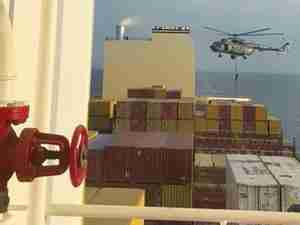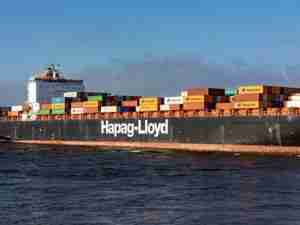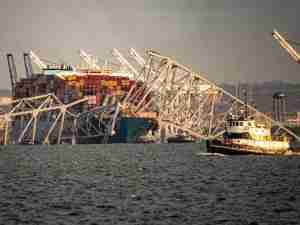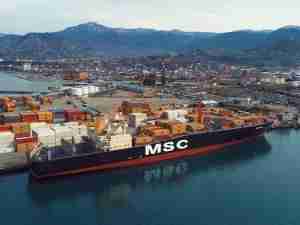Trident Alliance welcomes new members Crowley and Intermarine
posted by AJOT | Apr 10 2015 at 09:04 AM | Liner Shipping
With the 0.1 % Sulphur limit in ECA zones in place for more than three months, significant gaps in enforcement remain. Ship owners and operators continue their work through the Trident Alliance, the shipping industry initiative for robust enforcement of maritime sulphur regulations, and new members join.
“Efforts to improve enforcement in ports are underway, however how to ensure effective and robust enforcement on the high seas is only beginning to get the attention it deserves”, says Roger Strevens, Chairman of the Trident Alliance.
Recently Trident Alliance has been highlighting this issue at a range of events including the high-profile enforcement meeting held by the 16 SECA nations in Denmark.
“Given how critical it is for both environment and business, this challenge cannot be shied away from no matter how difficult it may be to resolve”, says Strevens.
New members
With the addition of the two US-based members Crowley Maritime Corp. and Intermarine, the Trident Alliance now has 35 member companies from across the world. Member company CEO’s have each signed a Statement of Commitment, in which they commit to supporting robust and transparent enforcement of sulphur regulations as well as to comply with said regulations.
Jacksonville-based Crowley is a privately held family and employee-owned company. The company provides project solutions, energy and logistics services in domestic and international markets by means of six operating lines of business: Puerto Rico Liner Services, Caribbean and Latin America Liner Services, Logistics Services, Petroleum Services, Marine Services and Technical Services.
“Crowley’s decision to align itself with the Trident Alliance makes sense on many levels,” explained Mike Roberts, Crowley’s senior vice president and general counsel. “First and foremost, Crowley’s long-standing support for and compliance with the sulfur regulations has been demonstrated throughout the years in no small part because, as a leader in the maritime industry, it is the responsible thing to do for the environment. Second, Crowley supports the fair leveling of the ‘sulfur playing field’ for the benefit of all parties involved.”
Intermarine, L.L.C. is headquartered in New Orleans, Louisiana, and provides worldwide transport of project, breakbulk and heavy lift cargoes. Intermarine provides ocean transportation and marine logistics services with liner services from the United States to the Americas and West Africa, and chartering services around the world. The Company maintains 22 offices located in 16 countries. Intermarine also operates the largest fleet of U.S. flagged multi-purpose vessels engaged in the international trade.
“As a U.S.-based company with a longstanding liner service from the U.S. Gulf to South America and Africa; substantial operations in Europe, and U.S. flagged vessels that are engaged in U.S based trade, Intermarine’s involvement with the Trident Alliance is consistent with the standards that apply to the company’s services,” said Will Terrill, Vice President, US Ocean and General Counsel. “The Trident Alliance will assist not only with leveling the playing field, but also with providing Intermarine with the opportunity to share its experiences with regard to different technologies and methods for compliance with sulphur regulations.”
#
More about the Trident Alliance
The Trident Alliance (www.tridentalliance.org) is a coalition of ship owners and operators who share a common interest in robust enforcement of maritime sulphur regulation as a means to ensure fair competition and are willing to collaborate to help bring it about. The Alliance partners with other stakeholder groups, who share the interest in robust enforcement, to work on specific initiatives that support this objective.
The organisations focus is on communication to raise awareness of the issue, supported by compliance transparency measures, as well as on initiatives to foster innovation in enforcement technology.
The Trident Alliance Members: American RORO Carrier, Ardmore Shipping Corporation, Biglift, Crowley, DFDS, EUKOR, Euro Marine Logistics, Flinter, Grieg Star, Hamburg Sud, Hapag-Lloyd, Höegh Autoliners, Intermarine, Ionic Shipping, J. Lauritzen, Maersk Line, Maersk Tankers, Marinvest, Nordic Tankers, Rickmers Linie, Scandlines, Scorpio, Seatrade, Solvang, Spliethoff, Stena, Torvald Klaveness, Transfennica, UECC, Ultrabulk, Ultragas, Ultratank, Unifeeder, Wallenius Wilhelmsen Logistics and Wijnne Barends.
For regular updates on sulphur regulations and their enforcement, join the Trident Alliance Group on LinkedIn.
On enforcement of sulphur regulations
Over the past years, significant steps have been taken to implement regulations to limit sulphur emissions from shipping. Whilst necessary, these regulations pose a significant cost and compliance challenge to the shipping industry. If the regulations are robustly implemented then compliance is the norm and competition is not distorted. However, when enforcement is weak a temptation is created to cut corners on compliance. The result is that regulations will not have the intended effect of protecting the environment and human health. Also, responsible shipping companies are put at a disadvantage relative to those who are intentionally non‐compliant.










